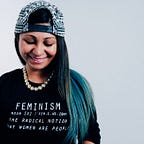Women + Web = <STRONG>
To kick-off Mozilla Festival (Mozfest) this year, we hosted the Women and the Web Convening on October 27th, 2016. In what was the first of it’s kind, this fringe event gathered almost 20 female leaders across the Mozilla Leadership Network from a variety of backgrounds and locations including USA, Canada, South Africa, Kenya, India and Mexico. The aim of the event was not only to convene these female leaders across our network, but also to build their organizing skills and help them establish a strong community of peers leading into Mozfest.
Earlier this year, with the launch of the Women and Web Literacy Hub and many Mozilla Leadership Network calls that focused on Women and the Web we had established a strong following around issues related to women in STEM. Working at the intersection of digital inclusion, equality, and education, bringing more women into STEM related roles is core to our work. We have seen community members sharing their stories on our International Women’s Day calls, running events for Ada Lovelace Day and participating at in-person Ada Lovelace Day workshops run by our staff. One thing we knew for sure, our network also deeply cared about getting women into STEM and was eager to get involved in work with others across the network to come up with solutions.
As someone working on gender issues within the network, this was one of the best things to see, feel and hear this year. I’ve focused much of my previous work on mobilizing people but here, within our network, individuals are already mobilized. They now need the tools to go forward. Understanding how to give them the tools was our next step. This is where we combined forces with the Mozilla Advocacy team to understand how we can give individuals the skills to organize around these issues they care deeply about. This also quickly became the focus for the convening.
The goals of the convening were to:
- Give attendees the basic understanding of how a campaign is designed. Work with them to learn how to view a problem, pick an appropriate solution and build the right targets or allies.
- Test a workshop focused on organizing with early MLN leaders with the hopes of documenting and running future organizing events for members.
- Encourage curiosity from attendees and share resources to help foster this kind of learning.
- Help attendees develop a strong gender-based cohort within our network that they can use for support, advice and inspiration.
- Start the conversation and skill building. Have attendees take the conversations and thinking into Mozfest and be stronger leaders because of it.
The event was structured to create a welcoming space for attendees to connect with each other and share experiences. We leveraged skill-building methods used by our friends like 350.org. You can view them here (page 200) and here. Attendees focus on the universal problem of “how to get more girls into STEM.” Using the problem we ran two exercises, the first being a problem tree to help identify how to target a crisp solution to a large problem. While asking groups to identify the needs, we asked them to outline what exactly girls needs to be able to successfully pursue STEM activities or roles. Afterwards we had groups select a need and identify 2–3 potential solutions for that issue. Once having a grasp of potential solutions we moved to the second exercise on mapping our allies and friends to our targets to get an idea of whom you work with to achieve these goals. While the exercises showed great options for potential expansion, the learning by attendees was far more powerful. Individuals commented on the ability to discuss their existing issues and find them similar across countries and fields, which was inspiring to see how we can tackle them together. While having similar problems, the contextual implementation of work and differences in this diverse group brought a unique perspective on the different challenges women would face locally and how we might be able to support each other with those challenges.
Upon working with the group to discuss how they would take the work into Mozfest and beyond, I felt a connected energy in the room. Reaffirmed by feedback like “I wish this can last longer” “really interesting setting a global perspective on this issue” “shared experiences are tackled collaboratively” “getting inspired by a lot of solutions” “glad to have a safe space that was established” “amazing diversity of voices” and “good to learn how context differs”. I’m excited to learn from this group and take this work forward. To continue to learn how to go from mobilizing to organizing. Effective and meaningful organizing.
While at Mozfest we continued to share our Women + Web = <STRONG> pins with other female leaders asking how they were going to make the web a better place and the response was overwhelming.
It’s no doubt we’re working with a great group of people here. It’s an honour to continue working with them to help scale their impact and bring change to the issues they care about.
Want to read more about the convening?
- Hear Mmaki Janjities, a Mozilla Clubs Regional Coordinator from South Africa, share her learning in her post-Mozfest blogpost.
- Kim Wilkens from the Learning Network shared her recap with her Tech Girl mailing list that you can see here. Kim also went on to run a session at the Global Educator Conference to debrief on the convening and share her findings with other educators. Her session, titled Women + Web = <STRONG> can be viewed here.
